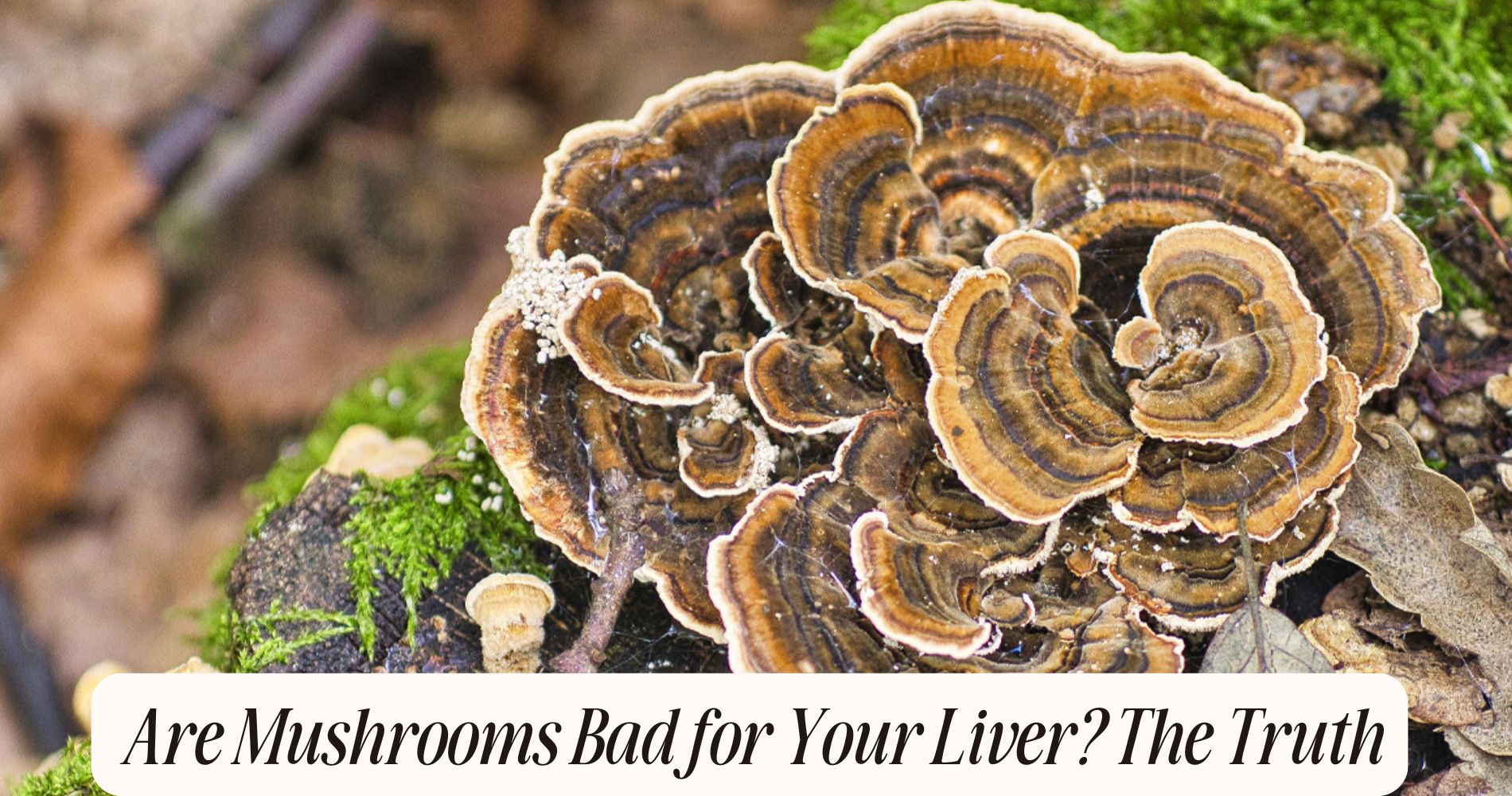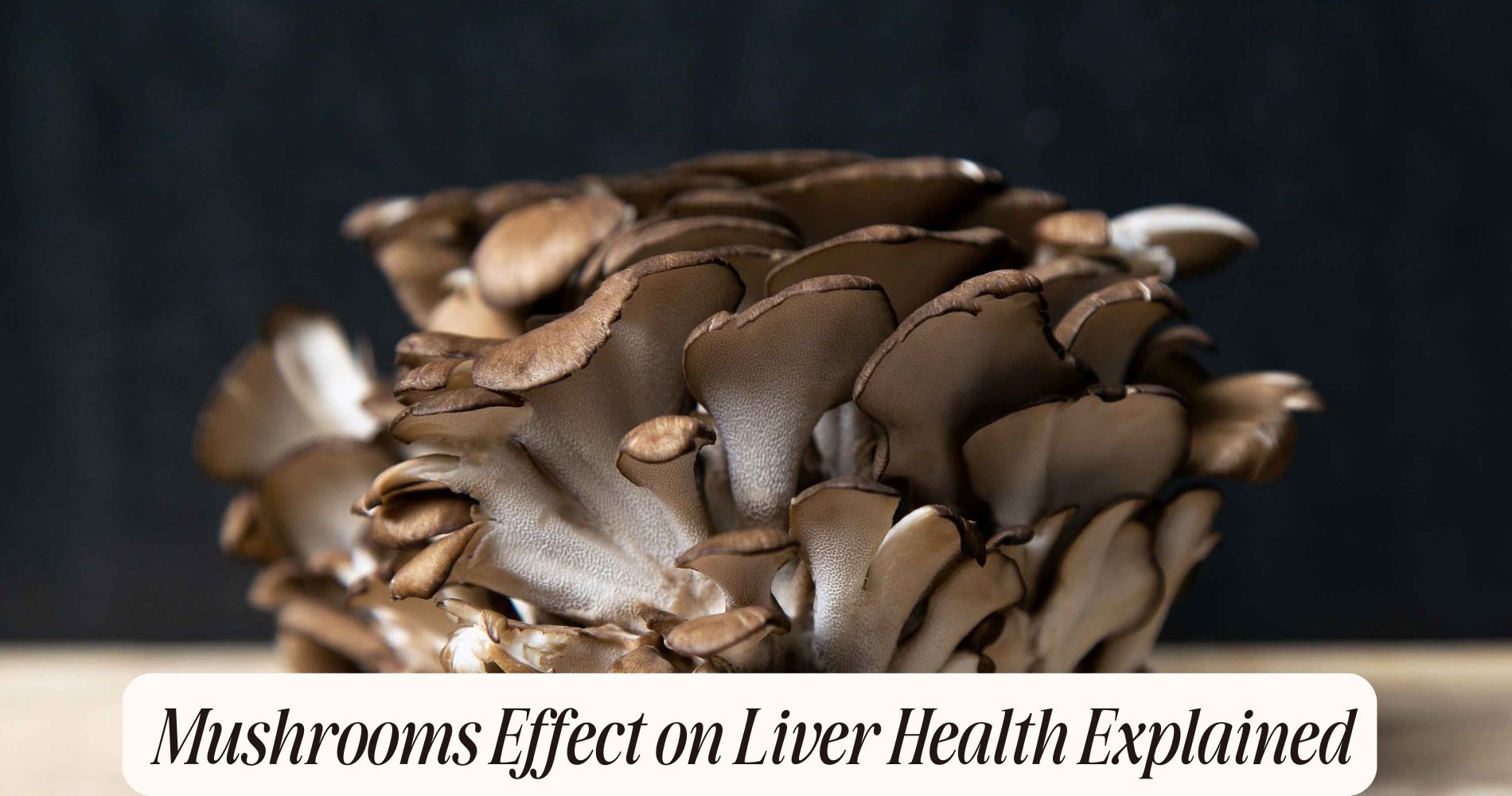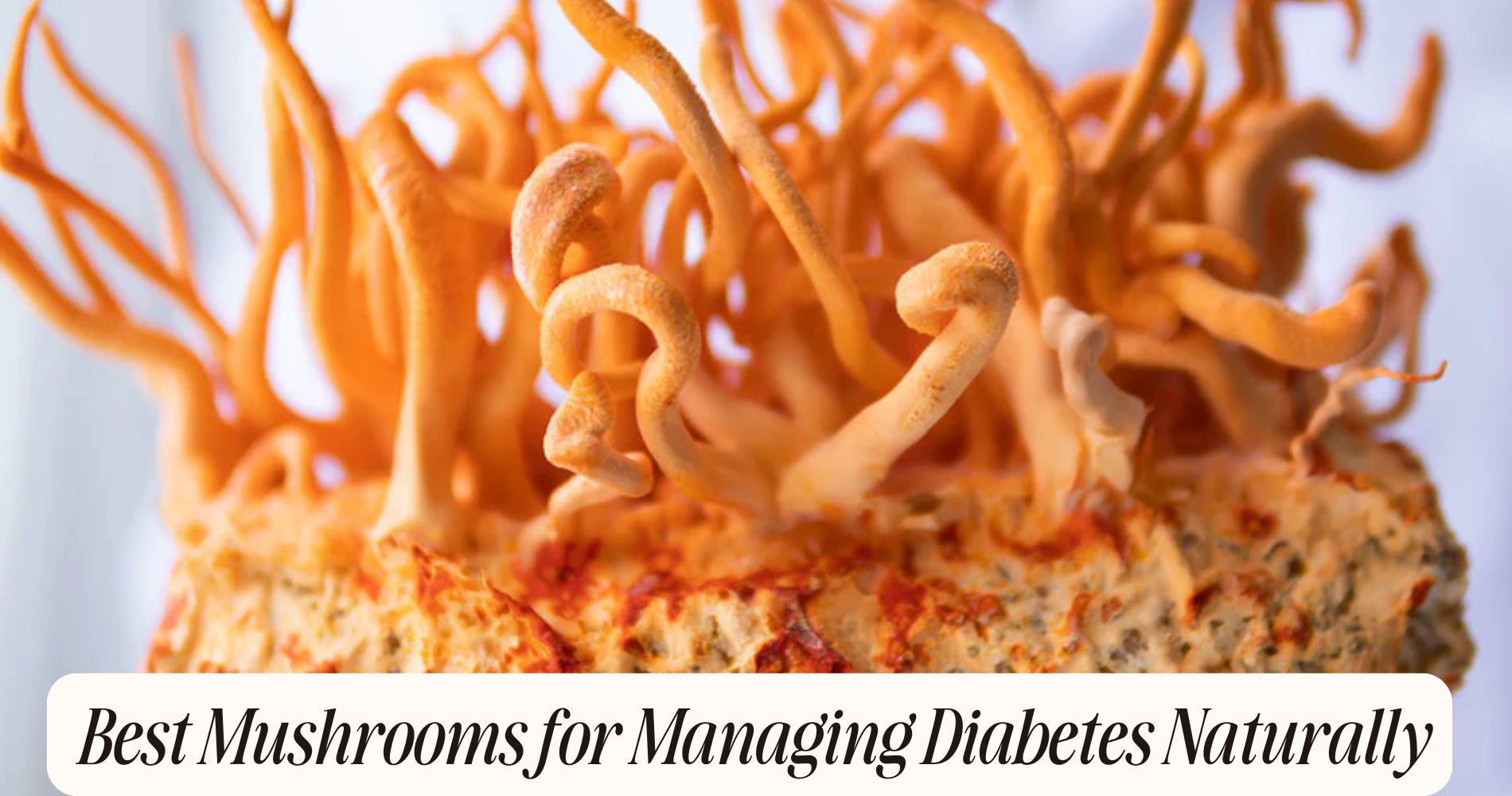
Are Mushrooms Bad for Your Liver? The Truth
Are mushrooms bad for your liver? Mushrooms aren't bad for your liver when you choose the right types and consume them responsibly. Varieties like shiitake and reishi have been shown to enhance detoxification processes and support liver health due to their bioactive compounds. They're rich in antioxidants, which reduce oxidative stress and inflammation. The misconception that mushrooms harm the liver often stems from toxic varieties, like the death cap, which should be avoided. As long as you source your mushrooms from reputable places and educate yourself on safe options, you can enjoy their benefits while minimizing risks. There's much more to discover about the impact of mushrooms on health.
Overview of Mushroom Types
When exploring the diverse world of mushrooms, it's vital to recognize that not all varieties are created equal.
You'll find a wide range of mushrooms, categorized primarily into edible varieties and those with notable medicinal properties. Edible mushrooms, such as Agaricus bisporus (common button mushroom), Pleurotus ostreatus (oyster mushroom), and Lentinula edodes (shiitake), are popular in culinary practices due to their flavor and texture.

These varieties not only enhance dishes but also offer nutritional benefits that contribute to overall health.
On the other hand, certain mushrooms are renowned for their medicinal properties. For instance, Ganoderma lucidum (reishi) and Cordyceps sinensis have been used in traditional medicine for their potential to boost immunity and enhance energy levels.
Research indicates that these mushrooms contain bioactive compounds that may help combat oxidative stress and inflammation, supporting liver health indirectly.
However, it's important to distinguish between beneficial mushrooms and toxic varieties. Always verify you're consuming mushrooms from reliable sources to avoid health risks.
Understanding the distinctions among mushrooms will empower you to make informed choices that potentially benefit your well-being.
Nutritional Benefits of Mushrooms
Mushrooms are rich in antioxidants, which play an essential role in combating oxidative stress in the body.
By incorporating mushrooms into your diet, you can support your immune health, enhancing your body's ability to fight off infections.
Understanding these nutritional benefits can help you make informed dietary choices for better overall health.
Rich in Antioxidants
The nutritional profile of mushrooms reveals that they're particularly rich in antioxidants, which play an essential role in protecting the liver from oxidative stress. Oxidative stress occurs when there's an imbalance between free radicals and antioxidants in your body, potentially leading to liver damage. Mushrooms' antioxidant properties, particularly those found in varieties like shiitake and maitake, can help mitigate this risk.
Research indicates that these antioxidants, such as ergothioneine and selenium, may help reduce inflammation and promote overall liver health. By incorporating mushrooms into your diet, you can enhance your body's ability to combat oxidative stress, which may lead to significant health benefits.
Moreover, studies suggest that the regular consumption of mushrooms could improve liver function by reducing the accumulation of fat in liver cells, thereby lowering the risk of fatty liver disease.
The unique combination of low calories and high fiber content further enhances their appeal as a healthful food choice.
Supports Immune Health
Boosting your immune system is yet another compelling reason to include mushrooms in your diet. Research indicates that mushrooms, particularly varieties like shiitake and reishi, possess compounds that can enhance your immune response. These fungi contain beta-glucans, which are known to activate immune cells, helping your body fend off infections and diseases more effectively.

The fungal benefits extend beyond just immune activation. Studies demonstrate that mushrooms can modulate the immune system, balancing its activity to prevent overreactions, which can lead to autoimmune disorders. This modulation is essential, as it helps maintain homeostasis within your immune system.
Incorporating mushrooms into your meals can also provide important nutrients, such as vitamins D and B, selenium, and zinc, further supporting immune health. These nutrients play significant roles in immune function, contributing to the production and activity of immune cells that protect your body.
Common Myths About Mushrooms
You might've heard that mushrooms can cause liver damage or that poisonous varieties are common, but let's examine these claims closely.
Research shows that the majority of edible mushrooms are safe and can even support liver health.
Understanding the facts can help you appreciate the role mushrooms can play in your diet without unnecessary fear.
Mushrooms Cause Liver Damage
Although many people fear that mushrooms can cause liver damage, this belief is largely rooted in misinformation and misunderstanding. While it's true that some mushrooms exhibit mushroom toxicity, particularly certain wild varieties, the majority of edible mushrooms are safe and even beneficial for your liver health.
Research indicates that common edible mushrooms, like button and shiitake, show no significant adverse effects on liver enzymes when consumed as part of a balanced diet.
In fact, studies suggest that mushrooms may actually promote liver health due to their antioxidant properties and ability to reduce inflammation. They contain compounds that can help regulate liver enzymes and enhance detoxification processes.
Misconceptions often arise from isolated incidents of mushroom poisoning, which primarily involve rare and toxic species.
It's essential to differentiate between these toxic mushrooms and the safe varieties you find in grocery stores. By educating yourself about the types of mushrooms and their effects, you can enjoy their nutritional benefits without fear of liver damage.
Consequently, the notion that all mushrooms are harmful to your liver is largely unfounded and overlooks the potential health benefits they can provide.
Poisonous Varieties Are Common
While many people believe that poisonous mushrooms are common, this notion is often exaggerated and misleading. In reality, the majority of mushroom species are safe to eat, and only a small percentage pose a threat to human health.
Edible mushroom identification is vital for anyone interested in foraging. You can greatly reduce your risk by familiarizing yourself with local varieties and learning how to distinguish between safe and toxic mushrooms.
Mushroom foraging safety practices emphasize the importance of not consuming any wild mushrooms unless you can positively identify them. Engaging with experienced foragers or educational resources can enhance your knowledge and skills.

Additionally, many regions offer guided foraging tours that can provide practical experience and help demystify the process.
It's essential to recognize that while poisonings do occur, they're often due to misidentification rather than a high prevalence of toxic species. By prioritizing education and cautious foraging practices, you can enjoy the diverse world of mushrooms without undue fear.
Mushrooms and Liver Function
Numerous studies indicate that mushrooms can play a significant role in supporting liver function. Research shows that various mushroom species, such as shiitake and reishi, contain bioactive compounds that enhance liver detoxification processes. These compounds may help reduce oxidative stress and inflammation, essential for maintaining ideal liver health.
In terms of mushroom metabolism, the liver is responsible for processing the nutrients and compounds found in mushrooms. The presence of polysaccharides, antioxidants, and vitamins in mushrooms can contribute positively to liver function. For instance, ergothioneine, an antioxidant found in certain mushrooms, has been linked to protecting liver cells from damage caused by toxins and free radicals.
Moreover, mushrooms are low in calories and high in fiber, which can aid in weight management—a key factor in preventing fatty liver disease. By incorporating mushrooms into your diet, you may support your liver's ability to detoxify and function efficiently.
Toxic Mushroom Varieties
When it comes to mushrooms, not all varieties are safe for consumption; some can pose serious health risks. Mushroom identification is vital for anyone interested in foraging or adding mushrooms to their diet. Many edible mushrooms have toxic look-alikes that can lead to severe poisoning.
For instance, the infamous Amanita phalloides, or death cap mushroom, contains potent toxic compounds that can cause liver failure. Toxic mushroom varieties often contain mycotoxins, which are harmful substances produced by fungi. These compounds can disrupt liver function, leading to acute health issues. Ingesting even small amounts of these mushrooms can be fatal, making accurate identification essential.
You should be especially cautious if you're inexperienced with mushroom foraging. Relying solely on visual characteristics can be misleading, as some toxic mushrooms closely resemble their edible counterparts. Resources like field guides and expert consultations are invaluable for ensuring safety.
Symptoms of Mushroom Poisoning
Recognizing the symptoms of mushroom poisoning is critical, especially after learning about the dangers posed by toxic varieties. If you've consumed wild mushrooms, you'll want to stay alert for specific signs that indicate poisoning. Common early symptoms include nausea, vomiting, abdominal cramps, and diarrhea. These may appear within hours of ingestion.
As the poisoning progresses, you might experience more severe symptoms like jaundice, confusion, and even seizures. In some cases, liver damage can occur without immediate symptoms, leading to a delayed diagnosis. This highlights the significance of mushroom identification; knowing which mushrooms are safe can be a key part of poisoning prevention.
If you suspect mushroom poisoning, it's important to seek medical attention immediately. Health professionals often rely on your description of symptoms and the type of mushrooms consumed to determine the best course of action.
Safe Consumption Guidelines
Guaranteeing the safe consumption of mushrooms involves a careful approach to selection and preparation. First, always choose mushrooms from reputable sources, like grocery stores or farmers' markets, to avoid toxic varieties. Familiarize yourself with the types of mushrooms you're buying; some edible mushrooms have toxic look-alikes.
When it comes to cooking techniques, thorough cooking is vital. Cooking mushrooms not only enhances their flavor but also reduces harmful substances, making them safer to consume. Sautéing, boiling, or roasting are excellent methods to guarantee that mushrooms are adequately prepared.

As for serving suggestions, pair mushrooms with complementary ingredients to boost both flavor and nutritional value. They work well in stir-fries, soups, and salads, or as toppings on pizzas and pastas.
If you're exploring wild mushrooms, consider consulting an expert or utilizing a field guide to confirm identification before consumption.
Research on Mushrooms and Liver Health
The potential benefits of mushrooms on liver health have garnered significant attention in recent research. Various mushroom varieties, such as Reishi, Shiitake, and Turkey Tail, have shown promise in supporting liver detoxification processes. Studies indicate that these mushrooms contain bioactive compounds, including polysaccharides and triterpenes, which may enhance liver function and reduce the risk of liver diseases.
For instance, research involving Reishi mushrooms has demonstrated their ability to exert antioxidant effects, potentially mitigating oxidative stress on liver cells. Similarly, Shiitake mushrooms have been linked to improved liver enzyme levels, suggesting they may help in liver regeneration and detoxification.
Moreover, Turkey Tail mushrooms have gained recognition for their immune-boosting properties, which can indirectly support liver health by promoting overall well-being.

While the evidence is still emerging, these findings highlight a growing interest in utilizing mushroom varieties as natural supplements for liver health.
However, it's important to approach these findings with caution, as more extensive clinical trials are needed to fully understand the extent of their benefits and any potential risks.
Expert Opinions and Recommendations
When it comes to incorporating mushrooms into your diet for liver health, expert opinions emphasize the importance of variety and moderation. Nutritionists and liver health specialists agree that while mushrooms can provide beneficial nutrients, relying too heavily on one type can lead to potential risks.
Expert insights suggest that you should diversify the types of mushrooms you consume, as each variety offers distinct health benefits and potential risks. For instance, shiitake and maitake mushrooms are praised for their immune-boosting properties, while portobello mushrooms are high in antioxidants.
However, some species, like the Amanita family, can be toxic and detrimental to liver health.
Dietary recommendations often include limiting your intake to a few servings per week, ensuring that you're not overloading your liver with specific compounds found in certain mushrooms. Additionally, cooking mushrooms is essential, as it helps break down potentially harmful substances.
Enjoy Mushroom Benefits Safely with SUPER MUSHROOM GUMMIES
Concerned about are mushrooms bad for your liver? With Well Gummies' SUPER MUSHROOM GUMMIES, you can enjoy the benefits of 10 powerful mushrooms in a safe and convenient way. These chewable gummies naturally fuel your brain, provide calm energy, and support immune function—all with a delicious wild berry flavor. No jitters or crash, just balanced energy and mental clarity to keep you going. Add these gummies to your daily routine for a tasty, liver-friendly way to boost your health and wellness!
Frequently Asked Questions
Can I Consume Mushrooms Daily Without Liver Concerns?
You can consume various mushroom varieties daily without liver concerns, as long as you maintain moderation. Research suggests they support liver function, providing antioxidants and nutrients that promote overall health when eaten as part of a balanced diet.
Do Mushrooms Interact With Liver Medications?
Mushrooms can interact with liver medications by affecting liver enzymes. While most mushrooms are safe, some may contain compounds leading to mushroom toxicity, potentially altering medication effectiveness. Always consult your healthcare provider for personalized advice.
Are There Specific Mushrooms Beneficial for Liver Detoxification?
Certain mushroom varieties, like reishi and turkey tail, can support liver health through their antioxidant properties and potential detoxification benefits. Incorporating these mushrooms into your diet might enhance your liver's overall function and resilience.
How Do Cooking Methods Affect Mushrooms' Liver Health Impact?
Cooking techniques greatly influence mushrooms' liver health impact. Proper preparation methods enhance nutrient retention, while excessive heat effects can degrade beneficial compounds. Understanding these factors helps you maximize mushrooms' potential benefits for liver health.
Can Mushroom Supplements Harm Liver Health?
Mushroom supplements can potentially harm liver health if they contain toxic varieties. Elevated liver enzymes may indicate toxicity. Always research supplement sources and consult healthcare professionals to guarantee safety and minimize risks to liver function.
Conclusion
In summary, while most edible mushrooms offer nutritional benefits and are safe for liver health, it's vital to be aware of toxic varieties and their potential risks. Misconceptions about mushrooms can lead to unnecessary fear, but understanding the facts is essential. Always prioritize safe consumption practices and consult with healthcare professionals if you have concerns. By doing so, you can enjoy the advantages of mushrooms without compromising your liver health.




